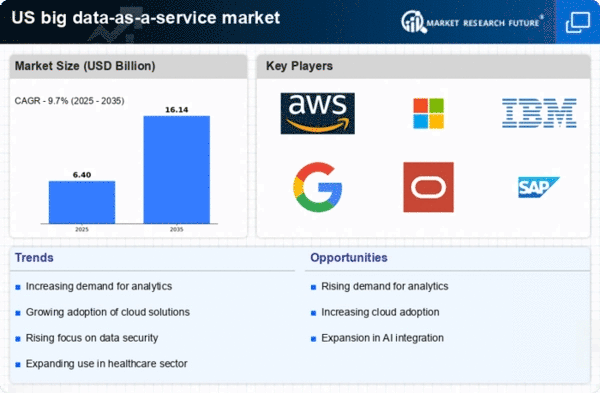Enhanced Data Collaboration
The need for improved data collaboration among teams is driving growth in the big data-as-a-service market. Organizations are increasingly recognizing that data silos hinder productivity and decision-making. Big data-as-a-service solutions facilitate seamless data sharing and collaboration across departments, enabling teams to work more effectively. This trend is particularly relevant in industries such as healthcare and finance, where data collaboration can lead to better outcomes and insights. As businesses strive to foster a culture of collaboration, the demand for big data-as-a-service offerings is likely to rise, contributing to the overall growth of the market.
Cost Efficiency and Scalability
Cost efficiency remains a crucial factor driving the big data-as-a-service market. Organizations are increasingly seeking solutions that minimize infrastructure costs while providing scalable data management capabilities. By utilizing big data-as-a-service, companies can avoid the substantial upfront investments associated with traditional data storage and processing systems. The market is witnessing a shift towards subscription-based models, which allow businesses to pay only for the resources they utilize. This flexibility is particularly appealing to small and medium-sized enterprises (SMEs) that may lack the capital for extensive IT infrastructure. As a result, the big data-as-a-service market is expected to expand as more organizations recognize the financial benefits of these solutions.
Growing Demand for Real-Time Analytics
The increasing need for real-time data analysis is a pivotal driver in the big data-as-a-service market. Organizations are striving to make data-driven decisions swiftly, which necessitates the ability to process and analyze vast amounts of data in real-time. This demand is reflected in the market, where the real-time analytics segment is projected to grow at a CAGR of approximately 30% from 2023 to 2028. Companies are leveraging big data-as-a-service solutions to gain insights that can enhance operational efficiency and customer satisfaction. As businesses recognize the value of timely information, the adoption of big data-as-a-service offerings is likely to accelerate, further propelling the market forward.
Regulatory Compliance and Data Governance
Regulatory compliance is a significant driver influencing the big data-as-a-service market. With the increasing complexity of data protection regulations, organizations are compelled to adopt solutions that ensure compliance with laws such as the GDPR and CCPA. Big data-as-a-service providers are enhancing their offerings to include robust data governance features, which help businesses manage data privacy and security effectively. This focus on compliance is expected to drive market growth, as organizations seek to mitigate risks associated with data breaches and non-compliance penalties. The emphasis on regulatory adherence is likely to shape the future landscape of the big data-as-a-service market.
Rising Importance of Predictive Analytics
The growing emphasis on predictive analytics is emerging as a key driver in the big data-as-a-service market. Organizations are increasingly leveraging predictive models to forecast trends, customer behavior, and operational challenges. This shift towards data-driven forecasting is prompting businesses to adopt big data-as-a-service solutions that can handle large datasets and complex algorithms. The predictive analytics segment is anticipated to witness substantial growth, with estimates suggesting a CAGR of around 25% from 2023 to 2028. As companies recognize the competitive advantage offered by predictive insights, the demand for big data-as-a-service is likely to surge, further solidifying its position in the market.

















